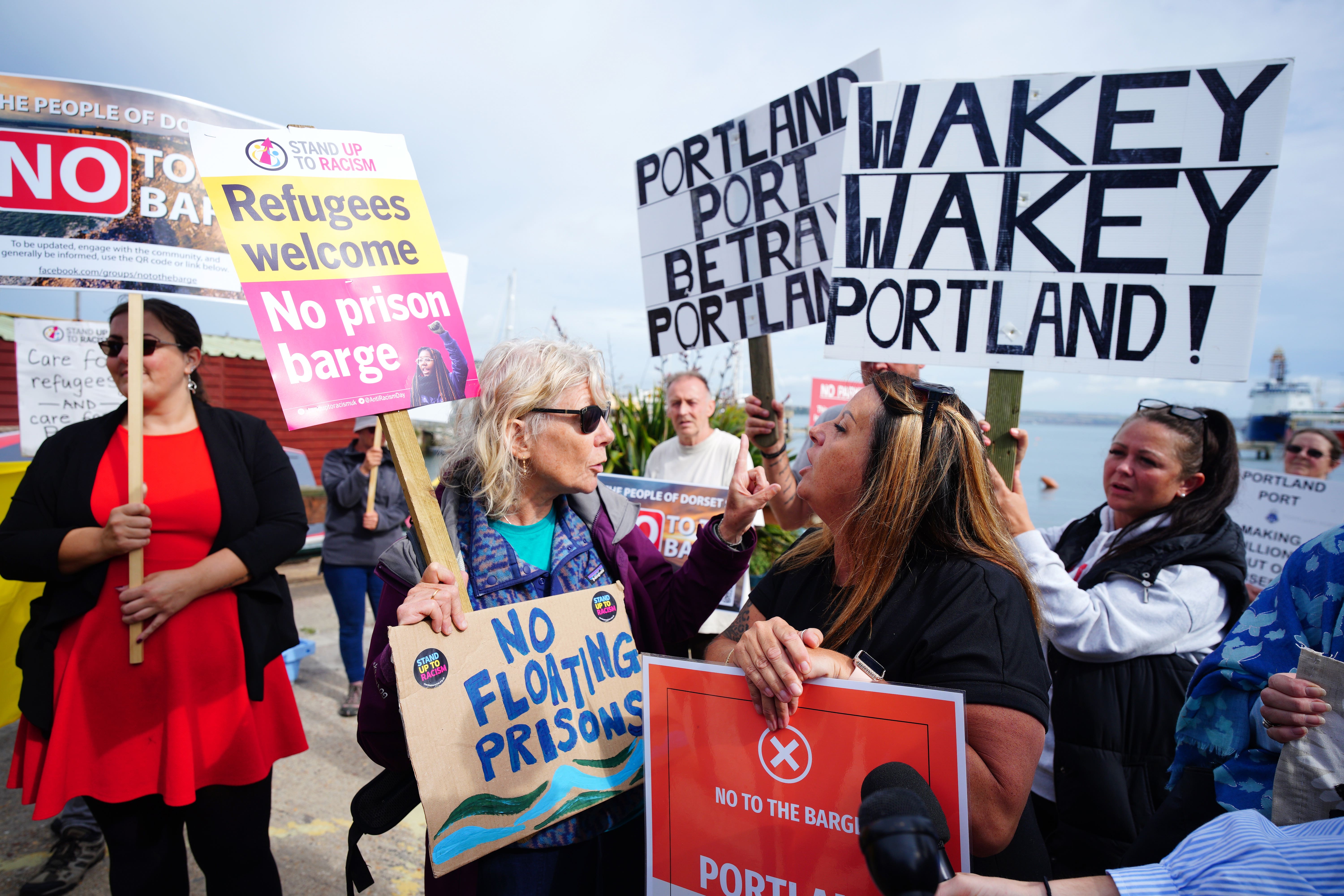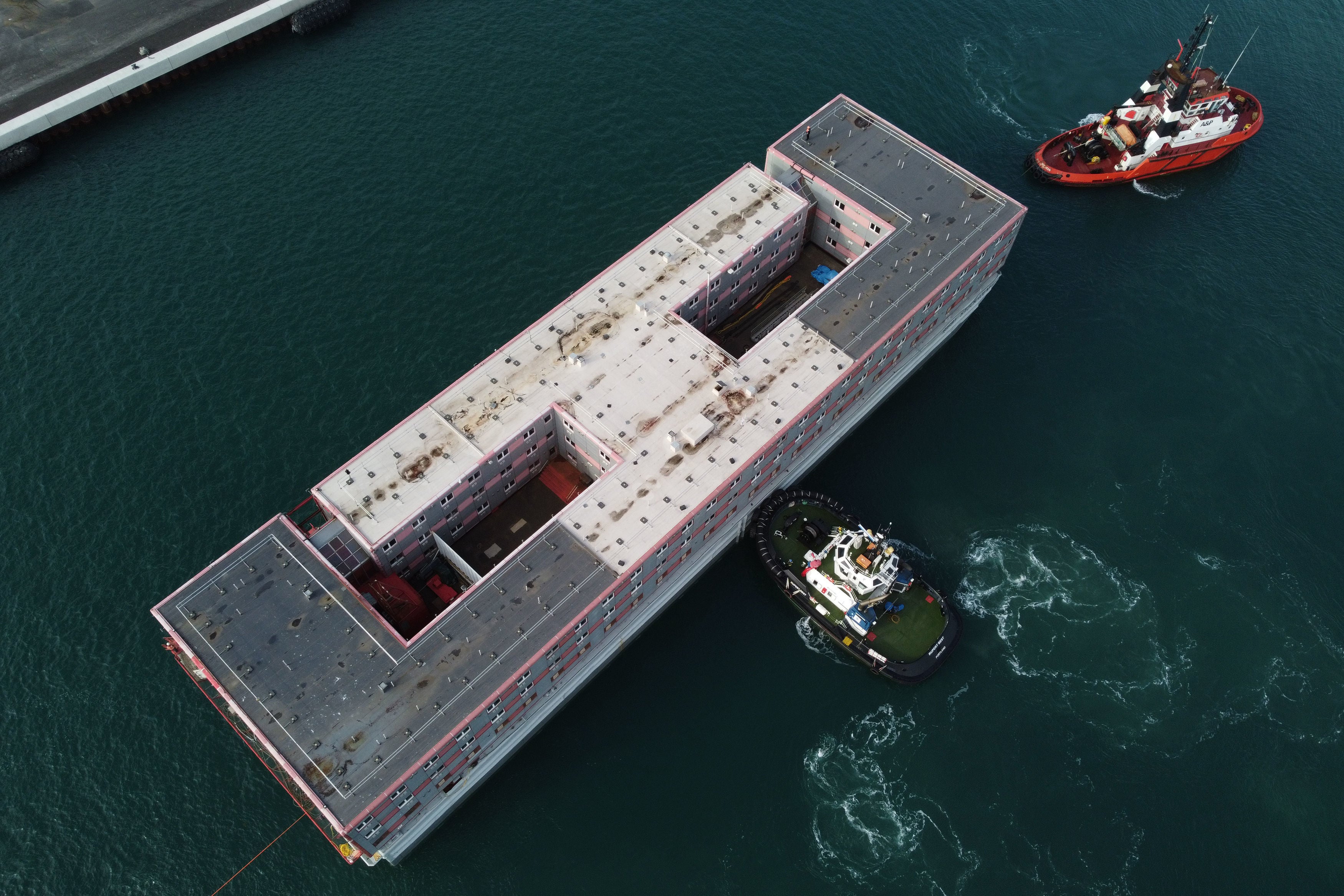Bibby Stockholm: Migrant barge with less living space than an average parking bay arrives in Dorset
Two more vessels commissioned by Rishi Sunak have nowhere to dock and are ‘returned to owners’
Your support helps us to tell the story
From reproductive rights to climate change to Big Tech, The Independent is on the ground when the story is developing. Whether it's investigating the financials of Elon Musk's pro-Trump PAC or producing our latest documentary, 'The A Word', which shines a light on the American women fighting for reproductive rights, we know how important it is to parse out the facts from the messaging.
At such a critical moment in US history, we need reporters on the ground. Your donation allows us to keep sending journalists to speak to both sides of the story.
The Independent is trusted by Americans across the entire political spectrum. And unlike many other quality news outlets, we choose not to lock Americans out of our reporting and analysis with paywalls. We believe quality journalism should be available to everyone, paid for by those who can afford it.
Your support makes all the difference.The Bibby Stockholm migrant barge has arrived in Dorset amid reports two more vessels commissioned by Rishi Sunak have nowhere to dock.
Opposing groups of pro- and anti-migrant protesters gathered at the quayside on Tuesday as the vessel, which is set to house 500 asylum seekers, was tugged into Portland Port.
Two more ships the prime minister said would house asylum seekers have so far been unable to find a berth, and Sky News reported that they had been sent back to their owners.
A Downing Street spokesman said the government was “continuing discussions both in terms of those who can provide additional accommodation facilities and sites where it can be housed”.
Although the Bibby Stockholm has arrived in its final destination, asylum seekers are not expected to arrive for at least another week as further work is done to make it suitable for habitation.
The Independent understands the vessel must be connected to the Portland Port's fresh water, mains sewage network and other services, after this it will undergo more tests.
Asylum seekers will then be brought on board gradually, starting with around 50, and scaled up amid ongoing concerns over the Home Office's decision to increase the barge's capacity from 222 to 506 people.
Richard Drax, the Conservative MP for South Dorset, likened the barge to a “quasi-prison” and has voiced concern about its impact on both asylum seekers and the tourist-dependent local economy.
“I remain very disappointed that this barge is being located in Portland Port, which is highly restricted and is the wrong place and solution to this issue,” he told The Independent.
“The government has given us the money that was asked for, although there are still concerns over how long this funding will last. We will continue to hold the Home Office to account, for it is they and the port that have imposed this barge on us with any prior consultation, which is discourteous at best.”

A private firm has been handed a £1.6bn contract to manage the Bibby Stockholm alongside other asylum accommodation and travel services, while the government is also covering costs for NHS services, the police and other public bodies.
Dorset Council is receiving £3,500 per occupied bedspace, and has also been given a one-off grant of almost £380,000.
A Home Office spokesperson said: “The government is providing substantial funding to local services including the police and NHS to support them and minimise the impact on the community, and there will be 24/7 security on site.
“The site is designed to be self-sufficient in order to minimise the impact on the local community, with catering, recreational areas and basic health care provision on board.”
Although the barge is not a detention facility, Portland Port has said that asylum seekers will “not be free to move around the port” and must stay either on the Bibby Stockholm or in an adjacent “secure compound”.
A bus service is to be provided to take asylum seekers to destinations in the local area that will be agreed with local agencies, and port officials have denied that people will be “dumped” in one place.
The Independent understands that counter-terrorism officials have assessed the security surrounding the barge, following a terror attack on a Channel migrant facility in Dover and the persistent targeting of asylum hotels by far-right groups.

The exact layout of accommodation on the barge has not been revealed but analysis by The Independent revealed that asylum seekers will have less living space than an average parking space when it reaches full capacity.
An official brochure showed there were only 222 “single en-suite bedrooms” on board before the Home Office-commissioned changes began, meaning that at least two people will have to be crammed into every cabin for the government to achieve its claimed capacity.
The rooms have en suite shower and toilet facilities and the vessel has a kitchen and restaurant, but it is unclear whether the Home Office has kept a previous TV and games room, gym and furnished bar.
When the Bibby Stockholm was used by the Dutch government to detain asylum seekers in the 2000s, at least one person died and there were reports of rape and abuse on the vessel.
One asylum seeker described “four people in a cell” on board, according to a 2008 Amnesty International report obtained by The Independent.
“There is only a little daylight in the cells … in the morning the guards would open the cell with their nose covered to protect themselves against the stench,” the asylum seeker said.
“The conditions force you into submission; they kill you psychologically.”

The vessel was later used for commercial contracts to house workers, with its owners saying a “major refurbishment programme” took place before a 2013 charter for Petrofac created the current layout.
Asylum seekers will undergo security checks and be screened for “suitability” to be housed on the barge, meaning that physical and mental health checks may exclude some particularly vulnerable people.
Portland Port has said that all asylum seekers housed on the barge will be adult males with an age range of 18 to 65, and will “receive cultural awareness advice aimed at ensuring they understand the social norms in the UK”.
An undisclosed “code of conduct” is being imposed for behaviour on the vessel and on land, and there will be sport and cultural activities laid on by the Home Office.
The Freedom From Torture charity called the barge’s use “cruel and inhumane”, warning of a “catastrophe waiting to happen”.
Clinical services manager Ann Salter added: “The government must abandon this plan immediately, and instead, address the asylum backlog which it has allowed to spiral out of control.”
Downing Street defended the use of the barge, insisting it is a cheaper alternative to hotels, where around 50,000 people are currently being accommodated at a cost of £6m a day.
It is also trying to shift asylum seekers to former military bases, but Suella Braverman’s attempt to bypass normal planning permission has sparked a wave of ongoing legal cases.
Around 50 migrants were moved to the RAF Wethersfield site in Essex last week, but the planned use of RAF Scampton in Lincolnshire and a former Sussex prison has not yet begun.




Join our commenting forum
Join thought-provoking conversations, follow other Independent readers and see their replies
Comments